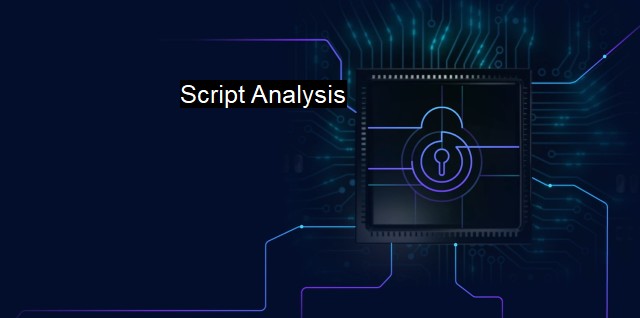What are Script Analysis?
The Importance of Script Analysis in Cybersecurity: Detecting and Mitigating Potential Threats
Script analysis is the process of analyzing a script, code, or set of instructions for the purpose of detecting and identifying potential security threats. script analysis is a crucial component in safeguarding computers and networks from attacks that can cause irreparable damage, siphon sensitive information, or disrupt seamless operation of the IT infrastructure.The use of scripts in web applications, email attachments, and malicious software is on the rise. A script can be used to automate routine tasks, but it can also be exploited to run malicious code that remains hidden from view. This poses serious cybersecurity risks, including phishing emails, ransomware attacks, and more. This is where script analysis comes in as an essential tool.
There are various techniques for script analysis, including static analysis and dynamic analysis. Static analysis involves analyzing the script code prior to being executed, while dynamic analysis occurs when the script code is actively running. Techniques can include code scanning, pattern searching, and behavioral analysis.
Code scanning is the process of scanning code in order to detect and identify potential security threats. This can include the identification of malware, data leakage, and use of SSL/TLS vulnerabilities. Pattern searching identifies patterns that are commonly associated with malicious scripts, such as the impersonation of reputable companies and the use of sandbox evasion techniques. Behavioral analysis can be used to monitor the behavior of a script during execution and identify anomalies, such as a script operating without user interaction or communicating with a questionable website.
All these techniques work to ensure that the code or script is safe and meets the predefined criteria for performance, efficiency, and security.
Given the constantly evolving and increasingly sophisticated nature of cyberattacks, script analysis is a fluid and continuous process. New threats and vulnerabilities are being discovered on a regular basis, so an up-to-date understanding of potential security threats is critical.
It is, therefore, essential for cybersecurity professionals and antivirus software to keep up with the latest trends and techniques to stay ahead of the attackers. Scanning software is a popular tool, but script analysis can only go so far – human expertise is also required in understanding the nuances of scripts and identifying patterns and anomalies that may be rooted in the nuances of the code rather than blatant viruses.
As such, an effective script analysis process involves an ideal combination of tools and human expertise. Effective file whitelisting software is a good start, which works by controlling access to files that may be vulnerable to intruders. Education and training, especially within organizations, employees, and stakeholders, is also equally relevant. Communing awareness of the different scripts, malware mostly harbor is a good countermeasure to early detection of threats before it decimates the security systems.
While script analysis is an essential component of cybersecurity, it is not the only defense. Monitoring networks, applying patches and updates, and maintaining strong passwords are also critical in safeguarding against cyber threats.
script analysis is the process of analyzing scripts, code, and instructions for the purpose of safeguarding IT applications and infrastructure from potential cyber threats and and exploits. Effective script analyses involve both human expertise and scanning tools to assess and monitor online behavior and detecting unusual code patterns. Areas of focus involve malware, phishing scams frequently employed by cyber attackers. By adopting a proactive cyber-defense system, through comprehensive immune response strategies, successful hampering of the damage attacks infected on the network can be possible.

Script Analysis FAQs
What is script analysis in the context of cybersecurity and antivirus?
Script analysis is the process of examining the code contained within a piece of software or webpage to identify any potential threats or malicious actions. It's an essential part of antivirus and cybersecurity software that helps protect against attacks like malware and phishing scams.Why is script analysis important in cybersecurity and antivirus?
Script analysis is crucial in identifying and preventing cyber attacks. Malicious code can be hidden within seemingly legitimate software or webpages, making it difficult to detect without analysis. Without script analysis, antivirus and cybersecurity tools would not be able to effectively protect against threats.How does script analysis work in antivirus and cybersecurity software?
Script analysis in antivirus and cybersecurity software involves using various techniques to analyze the code of programs and webpages for signs of malicious code or behavior. This includes static analysis, which examines the code before it is executed, as well as dynamic analysis, which observes the program's behavior during execution. The software then uses this information to identify and neutralize any potential threats.Can script analysis be bypassed or defeated by cybercriminals?
Script analysis can be challenging to bypass, but it's not impossible. Sophisticated cybercriminals may use techniques like obfuscation to hide their malicious code from analysis tools. However, antivirus and cybersecurity providers work continuously to improve their analysis techniques and stay ahead of new threats. It's important to keep antivirus software up to date to ensure the best possible protection against cyber threats.| | A | | | B | | | C | | | D | | | E | | | F | | | G | | | H | | | I | | | J | | | K | | | L | | | M | |
| | N | | | O | | | P | | | Q | | | R | | | S | | | T | | | U | | | V | | | W | | | X | | | Y | | | Z | |
| | 1 | | | 2 | | | 3 | | | 4 | | | 7 | | | 8 | | |||||||